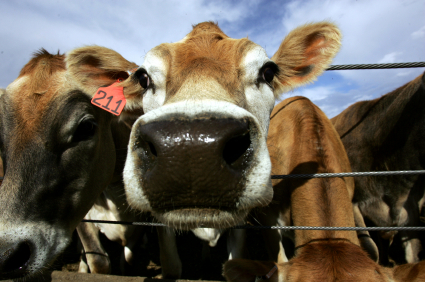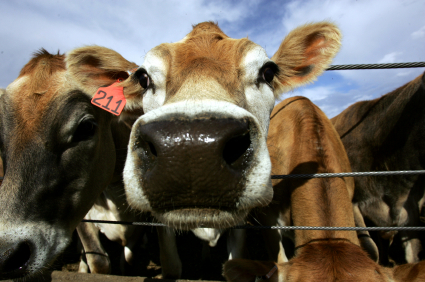 Safe enough for ya?UPDATE at bottom of story.
Safe enough for ya?UPDATE at bottom of story.
————————————
I normally don’t write about rumors or inside information. I aspire to be like the late journalist I.F. Stone, who scorned the dubious allure of insider “access” and kept his nose in government documents, where useful information leaks out. Today — as in its own time — Stone’s work makes much more worthwhile reading than that of his contemporaries who chummed up to insiders.
But I just got hold of a rumor that’s so weird, and from such a credible source, that I can’t resist writing about it. I am given to understand that Dennis Wolff, the Pennsylvania secretary of agriculture, is being “seriously considered” for the post of under secretary of food safety at USDA. Wolff’s name has appeared on short lists for a variety of USDA posts since the transistion. According to my source, the Obama administration is determined to “find a place for him” within the USDA. Precisely why is unclear — and certainly isn’t explained by his resume, as I’ll show below.
Oversight of meat production falls under the USDA’s authority (all other food items are handled by the FDA). Thus, the holder of this undersecretary position is responsible for overseeing the safety of the U.S. meat supply — which has given rise to a steady stream major public-health disasters in recent years.
Dennis Wolff would be an odd choice for this job — especially in an administration that promises change, or for that matter, experienced professionals in key roles. A look at Wolff’s official bio reveals no discernible experience as a food-safety regulator. (Many states run offices that inspect meat plants; Pennsylvania is not among them. All meatpacking in Pennsylvania is overseen by the USDA, not Wolff’s ag department.)
Before becoming his state’s ag secretary, Wolff operated “Pen-Col Farms, a 600-acre dairy cattle operation specializing in purebred Holstein genetics,” his bio tells us. As a large-scale livestock farmer, he hails from the very industry he would be overseeing in the USDA role for which he’s being considered. (In dairy, the USDA regulates livestock on the farm; the FDA takes over when milk arrives at the processing plant.)
Moreover, in his tenure as Pennsylvania ag chief, Wolff has displayed no special emphasis on food safety. Indeed, like most state ag commissioners, he focuses on the marketing and promotion end of things. Here’s his bio:
Since becoming Secretary, Wolff has worked with Governor Rendell on a variety of initiatives designed to strengthen Pennsylvania’s agriculture industry, including the Center for Dairy Excellence, PAgrows, Marketplace for the Mind.com, and the PA Preferred marketing program.
Wolff has also made great strides in improving Pennsylvania agriculture’s position regionally, nationally and internationally. He is an appointed member of the Agriculture Technical Advisory Committee to the World Trade Organization; past president of the Northeast Association of State Departments of Agriculture; and has organized and led several trade missions to key trading countries including Mexico and Cuba.
In the only really remarkable act of his term that I can find, he acted decisively against the principle that consumers have a right to know how their food is produced, in an episode that generated national headlines. In October 2007, he moved to prevent his state’s dairy farmers from labeling their milk free of an artificial, genetically modified growth hormone called rBGH, then marketed by Monsanto. The ban of rBGH-free labels came down after some dairy processors began to demand milk grown without the synthetic hormone.
The act was widely read as a blatant attempt to protect his state’s large-scale dairy farms that relied on rBGH, as well as the interests of the company that marketed it, Monsanto. The GMO giant had been lobbying for years for a nationwide ban on rBGH labeling; in Wolff, they finally had a taker, in an important dairy state. Wolff’s official rationale: rBGH-free labels “confuse the pubic.” In an article at the time, New York Times reporter Andy Martin took a long, hard look at Wolff’s official reasoning. His conclusion: “It’s hard … to find much merit in Mr. Wolff’s arguments for the labeling ban.”
The ban generated so much outrage (much of it from dairy farmers who rejected rBGH use) that within months, Pennsylvania Gov. Rendell intervened to reverse it.
It should be noted that the FDA’s early-1990s decision to green-light rBGH for dairy production ranks among its most controversial ever. As with the range of ag-biotech products now on the market, very little independent testing has been done on the effects of rBGH on human and bovine health — and what has been done raises serious questions. An FDA official named Michael Taylor, who previously had worked as a lawyer for Monsanto and would later serve as its chief lobbyist, ushered rBGH through the approval process. Just this week, Obama appointed Taylor to a key food-safety role at FDA.
Wolff serves on the board of trustees of the Penn State, a land-grant university that promotes rBGH for dairy production. The university’s Department of Dairy and Animal Science is headed by Terry Etherton, who blogs regularly in favor of rBGH treatments and other industrial-ag practices. Etherton is the author of the most widely cited paper (PDF) concluding that milk from rBGH-treated cows is identical to rBGH-free milk. The paper was co-authored by no fewer than five Monsanto-employed researchers, and concludes with this line: “Funding for this study was provided by Monsanto Company.”
In short, Wolff would represent a dismal choice as the public-safety advocate overseeing our meat supply. He’s a Big Ag man whose paper-thin record as a public servant is dominated by an apparent attempt to promote the interests of an agribiz giant over those of the broader public.
If this rumor represents a trial balloon on the part of the Obama administration, let’s hope it quickly deflates and falls to earth.
———————————–
UPDATE:
A reader writes in with something I missed. Wolff joined Governor Rendell in promoting legislation called called ACRE, or Agriculture, Communities and Rural Environment. The innocuous-sounding law strips counties of the right to impose their own regulations on CAFOs and other large-scale ag operations. Pennslyvania green groups including Citizens for Pennsylvania’s Future vigorously opposed the legislation. Obama Foodorama has more information on Wolff in a November post, when Wolff’s name was being floated for the top job at USDA, including more info on ACRE.




